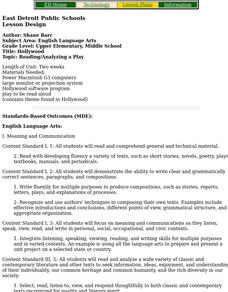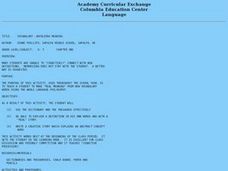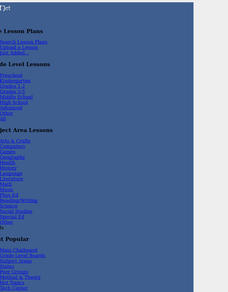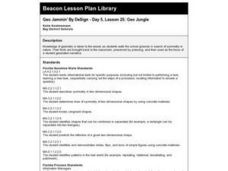Curated OER
Community Helpers
Students bring in a tool that represents the work their parents do. They present and discuss the tool and write a story about how the tool might be used. They discuss what they would like to do when they grow up.
Curated OER
Hollywood
Pupils listen to a play, or perhaps, take turns reading portions of it aloud. Afterward, they thoughtfully analyze and discuss the components of a well-written play. Next, a theme is assigned, and each person writes a play in conjunction...
Curated OER
Vocabulary - Unfolding Meaning
Students write the "word for the day" onto a note card. They add a definition, discuss in class and file the card in their own metal box. At the end of the week students play a game with the words from that week.
Curated OER
Native American Interdisciplinary Educational Unit
Pupils research various Native American stories and legends. They participate in reader's theater, write original legends, cook Native American foods, construct dioramas and view Native American art and artifacts.
Curated OER
What to do between AP Exams and Semester Finals
Students write multiple choice and extended answer questions for their own semester exams
Curated OER
Everybody Needs a Rock
Here is a instructional activity that rocks! Young scientists choose a rock and list words that describe it. They estimate the mass of their rocks and rank them within a group. They measure their rocks for volume and write a story that...
Curated OER
Vocabulary in the Content Area
Young scholars make connections between new vocabulary words and what they already know by illustrating the words and writing about them.
Curated OER
Balloon Fun
Pupils conduct an experiment with balloons and skewers. They speculate the reasons for the balloon's reactions to the skewers and write about their observations.
Curated OER
Critical Analysis: "Behind the Formaldehyde Curtain" by Jessica Mitford
In this "Behind the Formaldehyde Curtain" worksheet, students analyze the purpose and the meaning as well as summaryize the text. Students determine three elements that the author used to make her point.
Curated OER
The Research Paper - Searching for a Subject
Students research a website to look for potential topics for a research paper. They develop a narrowed prioritized subject list on an index card (3X5) using word processing program.
Curated OER
Geo Jammin' By DeSign - Day 5, Lesson 25: Geo Jungle
Students search the school grounds for examples of symmetry in nature. They bring examples back to the classroom and write about them.
Novelinks
Touching Spirit Bear: Question Answer Response Strategy
What types of questions help readers learn the most? Sixth, seventh, and eighth graders learn how to ask four types of questions from the Question Answer Response (QAR) reading strategy to help grow their comprehension of Touching Spirit...
Curated OER
Phineas Gage: Questioning Strategy
Focus on chapter two of Phineas Gage: A Gruesome but True Story About Brain Science with a questioning activity. After teaching and modeling several types of questions, learners work with partners and then independently to answer and...
Curated OER
Understanding Protagonists and Antagonists
How can you tell if a character is a villain? What about a hero? Work on literary analysis with an engaging language arts worksheet. After completing an activity about the four types of conflict, learners fill out a character map about a...
Novelinks
Tuck Everlasting: Similes, Metaphors, and Personification in Imagery
Poetic language is abundant in Natalie Babbitt's beautiful novel, Tuck Everlasting. Learners note the examples of similes, metaphors, and personification they find as they read, and illustrate how the language creates a sensory...
Curated OER
A P Literary Terms
Is a list of literary terms found frequently on AP English exams of value to test takers? Now there's a rhetorical question. Here's a list that provides definitions for everything from allegory to vernacular. To say the list is of value...
Library of Congress
The Emancipation Proclamation and the Thirteenth Amendment
How did the Emancipation Proclamation lead to the Thirteenth Amendment? Middle schoolers analyze primary source documents including the text of the Emancipation Proclamation, political cartoons, photographs, and prints to understand the...
Curated OER
Wildwood Dancing: Anticipation Guide
Themes in Wildwood Dancing, Juliet Marillier's young adult fantasy novel, are the focus of an anticipation guide that asks individuals to agree or disagree with a series of statements.
Novelinks
The Chosen: Biopoem
What better way to get to know a character than through a biopoem? Learners choose a character from Chaim Potok's The Chosen and create a well-crafted poem about his or her desires, traits, and ambitions.
Novelinks
The Tempest: Anticipation Guide
Begin your unit on William Shakespeare's The Tempest with a helpful anticipation guide. Learners read ten statements that connect to the play's literary themes, and note whether they believe the statement is true or false.
Polk Bros Foundation
Common Core Constructed Response Organizer
Get your writers ready to compose a constructed response essay in response to either an informational or fictional text. Pupils note down the big idea they wish to address as well as up to nine examples from the text that they wish to...
Curated OER
Phineas Gage: “This I Believe” Venn Diagrams After Reading Strategy
Difficulties with brain injuries still continue today. After reading Phineas Gage: A Gruesome but True Story About Brain Science, class members read a series of modern personal essays about brain injuries and choose an essay to compare...
Novelinks
The Tempest: QAR
Asking questions about a text is an effective way to improve reading comprehension. Apply the Question Answer Response strategy to your unit on William Shakespeare's The Tempest. As kids read each passage, they decide if the answer can...
Candace Fleming
Ben Franklin’s Almanac: Being a True Account of the Good Gentleman’s Life
Candace Fleming's award winning Ben Franklin's Almanac is the anchor text for a classroom guide that provides teachers with a cache of pre, during, and post-reading activities.

























